Scott H. Young's Blog, page 33
August 12, 2019
Discussing Ultralearning: Some of my Favorite Podcasts, Reviews and Essays
My book, Ultralearning, was just released last week. I’d like to share some of my favorite podcast conversations I’ve recorded (as well as some reviews and essays).
Conversations About Ultralearning
Here are some of the conversations I recorded as part of Ultralearning. There are still more to be released, but if you’re looking to listen to some of the ideas before grabbing the book, these should help you out.
Do you have your own podcast and would like to have me as a guest? Just shoot me an email and I’ll be happy to discuss it with you.
Man Talks – Understanding How We Learn, How to Learn Faster and Ultralearning
Modern Wisdom Podcast [VIDEO] – A conversation with Chris Williamson on Ultralearning.
Superhuman Academy – Tackling Amazing Learning Challenges Through Ultralearning (Side note: The host, Jonathan Levi is also something of an ultralearner and has his own book about learning coming out soon!)
How to Be Awesome at Your Job – How to Acquire New Skills Faster
Product People – teach yourself how to program, finally! Justin and I met at a retreat a few years ago and he’s just started learning to code after years of struggle. We have an in-depth conversation about applying Ultralearning to his self-ed quest to finally become a programmer.
Getting Simple – A longer conversation about Ultralearning.
The Action Catalyst – Ultralearning with Scott H Young.
Future Tech Podcast – Cranking Up Our Internal Learning Mechanisms for Maximum Productivity
Money Savage Engage – “differences between formal and informal learning and education, how technology is helping and hurting us and how “ultralearning” can help us rise to the level we want to”
Productivityist – Understanding Ultralearning (with my fellow Canadian Mike Vardy)
Tim Kenny [VIDEO] – The longest episode I’ve recorded at nearly 3 hours, this one goes into a lot of places including a lot of speculation (and probably half-remembered research) about cognitive science, machine learning and advanced ideas!
Financial Independence Europe – Araminta had already started on her own ultralearning projects after reading a review copy of the book. We chat about it on the podcast.
Stu Schaefer – The 9 Ways To Supercharge Your Learning Ability So You Can Learn Anything Lightning Fast
The Art of Fulfillment – How to Learn Any Skill in Rapid Time
Duct Tape Marketing – How Ultralearning Helps You Master New Skills.
Daniel Karim – How to Learn Anything
Leading Learning – How businesses and individuals can apply ultralearning.
[ADDED AUG 12, 2019] – Todd Nief
[Many of the podcasts I recorded have still yet to be released. I’ll be updating this page as they go live, with the date added, as they are uploaded.]
Book Reviews
Here are some reviews of the book:
Cal Newport recommends Ultralearning. Cal was the first person to push me to write this book, over three years ago. I’m glad he did.
Fast Company: How to Learn New Skills More Quickly and Effectively – FC’s Stephanie Vozza reviews Ultralearning.
Vox Stoica video essay reviewing the book.
How to study quantum mechanics on your own. Popular physics YouTube channel Looking Glass Universe discusses QM, with some notes on ultralearning near the end.
How to Learn Something New – An in-depth review of the book by David Masters over at FluentInThreeMonths. David got a copy of the book and applied it to learning music mixing over two weeks.
“The standard pace is for chumps.” – Review by Anthony Moore
How I’m Plotting and Writing a Novel in 40 Days – Alexis Romero reviews Ultralearning and applies it to improving his craft as a writer.
Did you write a review for Ultralearning, but don’t see it here? Send me a link and let me know. To avoid duplication, I’m going to link only to reviews from newspapers, blogs and external publications as opposed to social media or retailer reviews, but I appreciate those as well!
My Essays
In addition to reviews and conversations with other people, I’ve also written some pieces on other websites about Ultralearning. You can check them out here:
Want to Learn to Code? Don’t Go to School — I want to challenge the idea that going to university is the best path to learning to code. While four years may be best for some, an alternative path might be more effective for many.
Thank You!
I want to thank everyone who has gotten the book already. This book has been an obsession of mine for over three years, so I want to thank everyone who took the leap to read it.
If you have read the book, it would mean the world to me if you left a review. Reading the reviews left on Amazon, Audible and elsewhere from actual readers has been one of the most rewarding parts of writing the book.
Even better, if you decide to take up the call and start your own ultralearning project, I’d love to hear about it! You can include it in your review, or send it to me directly via email–if this book encouraged you to try learning something new, it will have been worth the effort.
The post Discussing Ultralearning: Some of my Favorite Podcasts, Reviews and Essays appeared first on Scott H Young.
August 6, 2019
Ultralearning is Now Available
Ultralearning: Master Hard Skills, Outsmart the Competition and Accelerate Your Career is now available.
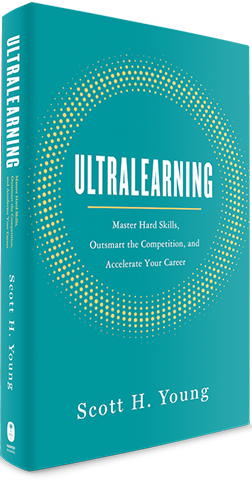
Being able to quickly master hard skills is essential to your work and life. This book will show you how to do it, drawing on dramatic stories of ultralearners and their projects, as well as detailed science on learning.
I wrote this book for two audiences. First, I wanted to introduce the ideas of ultralearning to people who haven’t yet been exposed to it. Things like:
Why the approach most students take to study is lousy, and what they should do instead. (Chapter 8)
How to create a system to prevent forgetting, instead of just blaming your bad memory. (Chapter 10)
Why many efforts to learn hard skills from programming to languages to public speaking, fail despite years of effort (and what to do about it). (Chapter 6)
Second, I wanted to write the kind of book I would like to read. I’ve spent the last decade of my life learning how to learn, but I still managed to discover quite a few interesting pieces of research that changed how I think about learning:
We all know feedback is important to learn. But did you know that in a comprehensive meta-analysis, over 37% of studies that examined the impact of feedback on learning found a negative effect? (Chapter 9)
Focus is important for learning, but is more always better? Being more alert may have its downsides, and the level of focus you aim for may depend also on the type of learning task you’re engaged in. (Chapter 5)
What is the illusion of explanatory depth, and why does it make hard subjects like math, physics or programming so challenging? What is the cognitive process behind great intuitive minds like Richard Feynman or Albert Einstein? (Chapter 11)
I’ve worked harder on this book than anything else I’ve ever written. I think if you’ll read the book you’ll agree. Whether you’re struggling with learning or feel like you’re already accomplished and just want to add a few tools to your repertoire, this book is for you.
Ultralearning is available on all major platforms including Amazon, Barnes & Noble, Audible (narrated by yours truly) and more.
The post Ultralearning is Now Available appeared first on Scott H Young.
July 29, 2019
Conquering Public Speaking: From Zero Experience to World Championships in Seven Months
When I started working on my upcoming book, Ultralearning, I wanted to document people who took on intense and ambitious learning projects, like the MIT Challenge or Year Without English.
I found many examples, but a little voice always nagged in my head–maybe these people were just naturally good at learning!
What I really needed was an experiment. Take someone who hadn’t done an ultralearning project before, coach them in the basics, and see how far they could go. So, I gathered a small group, and gave them some advice on starting their own ultralearning projects.
Tristan de Montebello was one of these volunteers. When I started working with Tristan, he wasn’t even sure what he wanted to learn. He was a guitarist, so for awhile, he was thinking maybe another musical instrument, like piano.
After a few weeks of thinking, however, he decided on public speaking. He had almost no experience giving speeches, and it was a skill he thought might be useful. After all, everyone could benefit from being a better speaker, no?
What followed, however, exceeded both our wildest expectations. In less than seven months, Tristan went from near-zero experience to competing in the finalists for the World Championship of Public Speaking.
This is his story. Enter Tristan…
From Zero to World Championship in Seven Months
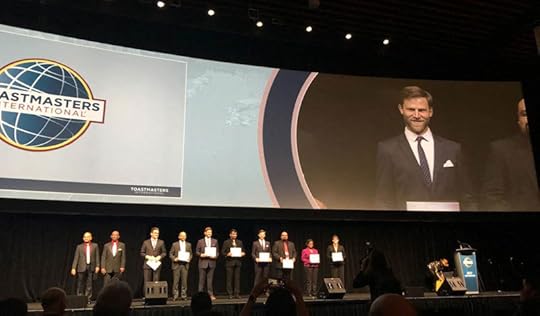
I’m on a giant stage in front of 3000 people, broadcasted live, at the finals of the World Championship of Public Speaking.
The crazy thing is that seven months earlier, I knew nothing about public speaking.
Here is what I learned.
Lesson One: People Ignore Advice But Listen To Stories
I signed up for the World Championships with zero public speaking experience. I only had two weeks to write a speech that would win me the first round of competition. The only problem was that I had no idea what a winning speech even looked like.
So I began my research. First, I watched every world championship speech dating back to 1995. Then I rewatched all of my favorite speeches on YouTube. I watched the top ten TED talks of all time. I asked people what their favorite talks were, and I watched all of those too.
I discovered that the best speakers all did one thing remarkably well: tell stories.
So I began crafting an epic story based on a time in my childhood when I was forced to face my fears. I hoped it would be inspiring but when I shared it with my coach, Michael, he was not at all impressed.
In fact, he pointed out that I made a fundamental mistake. One that many novice speakers make.
The insight Michael shared that day changed everything for me:
“If you want to inspire, don’t be the hero of your own story.”
He explained that people don’t want to learn from you, they want to learn with you. For the audience to really connect with me, I needed to take them on a journey where I wasn’t the teacher but the student. The words of wisdom couldn’t come from me; they had to come from other characters in my story.
In my speech, I wanted to inspire people to face their fears. Instead of just telling the audience to go face their fears, I added in a grandmother character to do it for me. She became the mentor, a common figure in all great stories (think Yoda and Dumbledore).
It turns out this was the edge I needed.
On competition day, I was stunned to see that most of my competitors fell into that exact trap. They had inadvertently made themselves the mentors. I believe this is a big part of why I placed first that day. I didn’t win the judges over. My grandmother did.
Takeaway: If you want to inspire, don’t be the hero of your own story.
Lesson Two: You Don’t Need To Be Prepared In Order To Feel Prepared
In two hours, I had to go on stage to give a speech I’d just finished writing.
I told Michael, my coach: “I can’t do it. I don’t feel ready.”
He answered: “You don’t need to feel ready.”
___
At the start of the competition, I learned that most seasoned contestants were speaking only once a week. They could afford it, they were already great speakers. But I wasn’t. For me to have a fighting chance, I would have to speak daily.
So early on, I booked as many speaking engagements as I could.
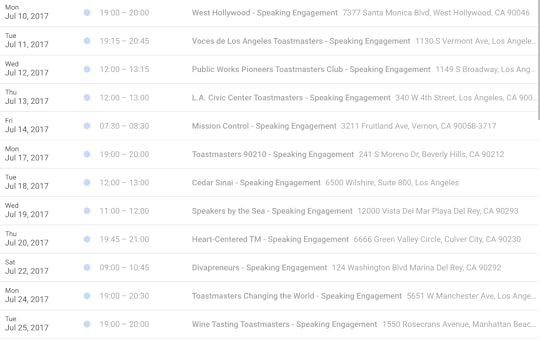 A glimpse of my speaking schedule
A glimpse of my speaking scheduleThe only problem was that I wasn’t always ready. There wasn’t enough time in between speaking engagements to write, edit, and memorize new content. I’d often show up in front of audiences with only a few half-baked ideas in my mind. And I would have to improvise the rest.
It was uncomfortable as hell. I often lost my train of thought. I blanked on stage a lot. And I was on the receiving end of many disappointed sighs. But every time I walked on stage, I felt a little more familiar with the uncomfortable feeling of being unprepared
The peak of adrenaline became less and less surprising. I grew more and more confident in my improvisation skills. And I began to deliberately leave empty spaces in my scripts to see what my brain would come up with under pressure.
Soon I had built a deep trust in my brain’s ability to come up with great content on the spot.
I no longer needed to be prepared in order to feel prepared.
Takeaway: To feel more prepared, build the skill of speaking on the spot.
Lesson Three: No One Gets Better Without People’s Opinions
I was 12 years old and I’d just moved to France.
On my first Halloween, I walked into my classroom wearing a full-length wedding dress.
Do you know what I learned that day?
…
The French do NOT celebrate Halloween.
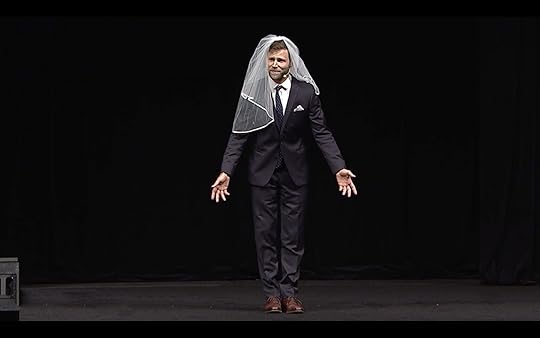 My first 5 seconds on the World Championship stage
My first 5 seconds on the World Championship stageI delivered this anecdote as my opening line in front of 3000 people in the finals of the World Championships. The response was roaring laughter. It was thrilling, but not surprising. I was certain this joke would hit.
It was guaranteed thanks to the comedian’s approach.
The Comedian’s Approach
When Chris Rock builds a new special, he doesn’t isolate himself for weeks on end to build an hour of content. He goes to small comedy clubs and tests his material day in and day out. Through this process, he discovers that certain jokes hit and certain jokes miss. Sometimes, people will even laugh at parts that weren’t intended to be funny.
Regardless, he goes home each night and reworks his material based on the audience’s reactions. Then he tries it all over again the next night.
Going into the competition, I knew that the comedian’s approach would be my secret weapon against even the most seasoned speakers. As I was building my speech, I followed the same pattern:
Idea / Joke –> Live audience –> Instant feedback.
The process made my ideas better, my jokes funnier, and my delivery stronger.
The feedback wasn’t always kind, it wasn’t always easy to hear, but it was honest, and it changed everything.
Takeaway: Get feedback before you’re ready to hear it.
What It Was Really Like
7 quick facts about my 7-month project:
500 hours on the project.
80-100 speeches to live audiences.
Midway through my project, my wife delivered our second child.
30 hours memorizing speeches on the treadmill. My glutes were glorious.
I gave speeches at Toastmasters, schools, improv groups, and even to strangers on the street.
Michael slept on my couch for the final 2 weeks.
I asked for feedback from movie directors, improv teachers, and close friends. And I’d never share a speech without running it by my wife.
What Can You Learn From My Ultralearning Project?
I studied the art of giving a world-class speech for seven intense months. I anticipated that this experience would make me a better speaker. But what I didn’t expect were the side-effects of my training.
After the World Championships, I started to feel more spontaneous in conversations, more relaxed in social gatherings, and more confident in my everyday life. Learning public speaking didn’t just change the way I felt on a stage. It changed the way I felt as a person.
It’s rare that we find ourselves standing in front of 3000 people on a stage. But every day we find ourselves speaking at work, at home, and out in the world. If we spend so much time speaking, we should at least enjoy it.
But too many people think that public speaking isn’t something they can learn. They think that you’re either born with it or you aren’t.
They’re wrong.
If I can leave you with one final thought, it would be this:
Public speaking is a skill. Learning it will change your life.
.tristan-optin { display: flex; border: 3px solid #219895; align-items: flex-start; padding: 1em; margin-bottom: 25px; } .tristan-optin img {flex-grow: 1; flex-basis: 0;} .tristan-optin p {font-size: 22px;} #om-qf048sezthdvp4lzuhlu-holder{display: none;} .tristan-optin div {flex-grow: 2; flex-basis: 0;} @media only screen and (max-width: 767px) {.tristan-optin { flex-direction: column;}.tristan-optin img {width: 260px; margin: 0 auto;}}
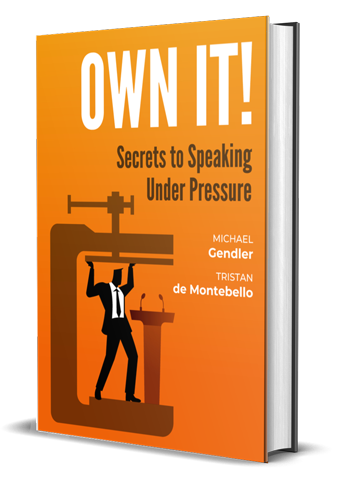
To learn more about conquering your fear of speaking and making pressure an asset, join Tristan & Michael’s newsletter and get a free copy of their eBook: “OWN IT! Secrets to Speaking Under Pressure” (Unexpectedly powerful insights such as using your brain’s autocomplete function, how bowling can help you with on-the-spot speaking, the power of speaking before you think, and more.)
The post Conquering Public Speaking: From Zero Experience to World Championships in Seven Months appeared first on Scott H Young.
July 26, 2019
The Best Articles on Feeling Better
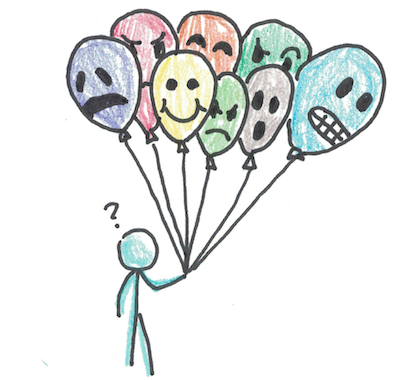
Our emotions are just as important as our thoughts when it comes to living better. How you feel can drive what you do much more than logic and reason. I’ve written quite a few articles on managing your emotions, overcoming frustration and finding happiness over the years, here are some of the best.
The 5 Best Articles on Managing Emotions, Overcoming Stress and Finding Happiness
The Critical 7 Rules to Understand People – Seven rules to understand other people and yourself.
Some Things That Have Helped Me Worry Less – Some strategies I’ve used to battle anxiety and stress.
How to Stop Feeling Like an Impostor – Feel like a fraud? Here’s how to overcome your own insecurities.
Book Review: The Wisdom of Insecurity – Alan Watts’ unconventional approach to life, with my own thoughts.
Emotional Mastery – A six-part series on how to manage your emotions to perform and feel better.
Reducing Stress and Anxiety
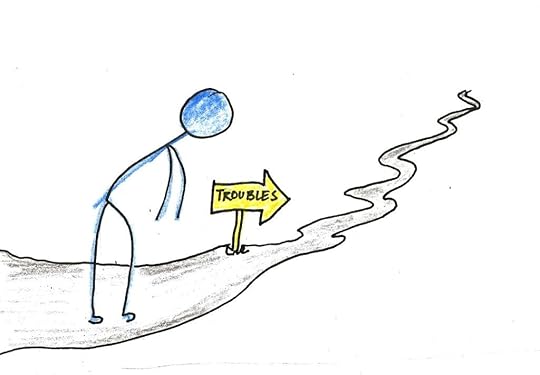
How to Worry Less What Other People Think of You
How to Push Past Your Analysis Paralysis
Richard Feynman on Self-Doubt and Meeting Others’ Expectations
Manageable Awfulness and How to Let Bad Things Happen
Fear of Loss
How I’m Learning to Stop Worrying
How to Be Relaxed, Even When You’re Busy
Relationships and Other People
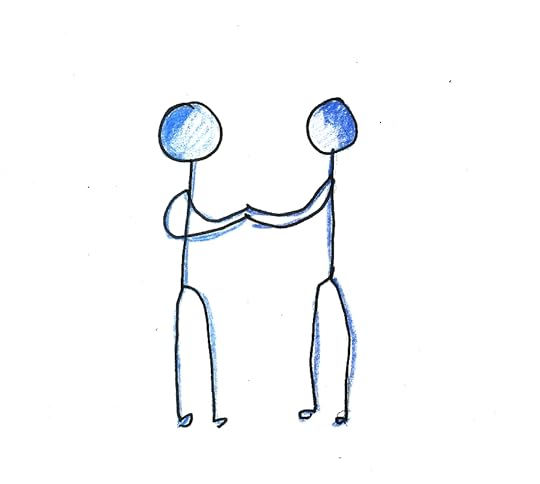
Haters are Good: Why You Need Your Critics
How to Be Nice (Without Being a Pushover)
How to Learn Social Skills
Why You Need Mentors (And Why You Don’t Have Them Yet)
The Empathy Problem
Could You Sell Who You Are in 30 Seconds?
Do You Need Friends That Think Like You?
The Importance of Being Likeable
Loneliness and the Unconventional Life
The Reason People are Unhappy in Relationships
How to Meet Interesting People
How to Escape the Toxic Friends Holding You Back
In Praise of Solitude
How to Be More Social
How to Develop a Thicker Skin
How to Figure Out What People Want
Better Conversations: Collecting Life Stories
Do You Need Other People to Support You?
Happiness
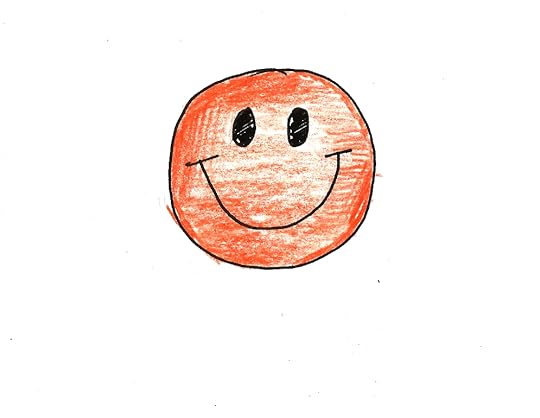
The Path to Happiness: Do What You Love, Not What You Like
Seven Biographies You Should Read to Live a Better, Richer and Happier Life
The Problem of Happiness – Why is it so hard to chase after?
Happily Ever After – Are we really looking for a happy ending?
Does Dreaming Smaller Result in Living Happier?
Should You Strive to Live Happily or Live Good?
Mental Aikido: The Necessity of Unhappiness is the Ideal Life
Will Reaching the Ideal Life Make You Any Happier?
It’s Okay to Be Unhappy
You’re Allowed to Be Happy and Ambitious at the Same Time
The Zen of Folding Laundry and Other Thoughts on Happiness
Get Happy: Making Decisions for Emotional Quality
Motivation
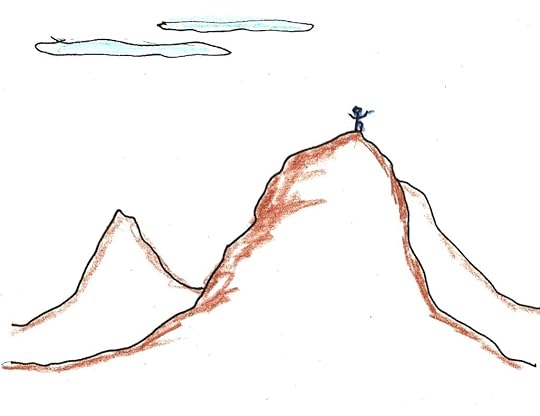
You Probably Have Too Much Motivation
Itchy Chair Motivation
How to Stay Motivated in Long Projects
Gumption
Finding Motivation for Improbable Goals
The Key to Motivation: Forget Goals, Focus on Projects
9 Ideas to Overcome Discouragement
Avoiding Motivation Burnout
The post The Best Articles on Feeling Better appeared first on Scott H Young.
July 25, 2019
The Best Articles on Thinking Better
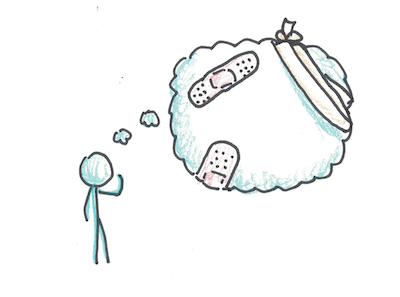
How should you think about the issues that matter to your life? Make tough decisions, reason clearly and avoid common mistakes? Below are some of my best articles offering insights into thinking better:
The 5 Best Articles on Thinking Better
Here are the five best essays I’ve written to help you think better in your life:
How to Improve Critical Thinking – Hint: Just learning about mental models, rationality or taking a logic class won’t help much.
Unraveling the Engima of Reason – I cover one of my favorite books, explaining how human reason works, and why this has big implications on how we think about ourselves.
Twenty-Five Useful Thinking Tools – Thinking of professions as mindsets you can cultivate to solve your problems.
The Art of Unlearning – To think better, we must first unlearn all the things we think about the world that just ain’t so.
How to See Reality As It Is – There’s no such thing as seeing reality as it is, just different perspectives that are useful for different purposes.
Useful Mental Models
Some ideas are so powerful that, once you learn them, you start to see them everywhere. My series on useful mental models includes many of these patterns, shows you how to use them and also how to avoid applying them to situations where they don’t fit:
Efficient Markets (and the Efficient Market Hypothesis)
Exponential Growth
Normal Distribution
Evolution by Natural Selection
The Two Types of Mistakes (Type I and Type II Errors)
Multiply or Add? Asking yourself the operator in question can make a big difference.
Chaos, Ignorance and Newton’s Great Puzzle – An intro to chaos.
The Isomorphism of Ideas
What are the Intellectual Ideas Everyone Should Know?
Thinking about Thinking
The World is a Hierarchy (Our Theories Aren’t) – Our reality is built out of simpler building blocks, but the theories *of* those blocks are built on human minds. Does our philosophy say more about the world or ourselves?
Life’s Wicked Problems (and How to Get Past Them) – Wicked problems are really difficult to solve, here’s how to spot them and work on them despite their wickedness.
Is Ultimate Truth a Superstimulus?
How to Think Better
Building Up Your Intellectual Immune System
Does Choice Exist? My views on free will, and what I think most people get wrong when they take either extreme view.
Choose Your Signal Wisely – We tend to think in terms of signals and correctives, this means how you frame an issue can make a big difference in how you choose to act.
Discovering the Meta – What’s the next level of abstraction or reference that you’re not seeing in the problems of your life right now?
Gri-Gri, Money and Bootstrapped Truths – Does thinking something is true make it so? For some things the answer is actually yes!
Simplicity Beats Nuance: Why The Wrong Answer Can Often Beat the Correct One
Advice Reversals – When does useful advice actually become harmful?
Is Rationality Overrated? What an 18th Century Medical Mystery Can Tell Us About the Power of Blind Copying
When is it Good to Be a Hypocrite?
Here’s Some Things I’ve Change my Mind About (circa 2015)
The Two Ways to Evaluate Ideas
You Don’t Pay Enough for Information
Why the Smartest People Don’t Always Give the Best Advice — The Importance of Local Wisdom
Different Kinds of Difficulty
Bias is Inescapable
How Do You Make a Good Analogy?
Why Do Engineers Think They’ll Be Good at Picking Stocks?
Does Speaking Another Language Change How You Think?
The Danger of Easy Skepticism
Don’t Think for Yourself
Are Blogs Better Than Books for Mastering Complex Ideas
The Strangeness of Everyday Things
Healthy Delusions?
Learning to Doubt
The “Single Flaw” Fallacy
Why Honest People Cheat
Why I’ve Decided to Be Wrong More Often
Is It Better to Read Books You Disagree With?
and How to Read Books You Disagree With
Keep a Journal to Solve Tough Problems
The post The Best Articles on Thinking Better appeared first on Scott H Young.
July 24, 2019
An Introvert’s Guide To Building Confidence (In 4 Not-So-Easy Steps)
Confidence in social situations is hard to build when you’re an introvert. How do you feel confident when socializing doesn’t come naturally to you? Here are some tips:
1. Join Toastmasters
Public speaking and having conversations are different things. However, a lot of the same skills exist in both. Knowing how to tell stories. Knowing how to listen. Knowing how to overcome your verbal tics, awkward pauses and rambling stories.
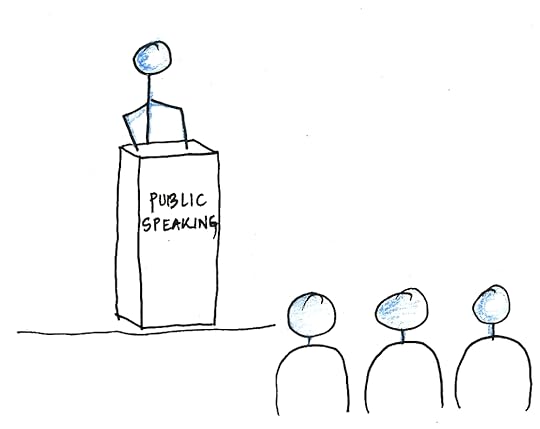
Toastmasters is a good place to build on some of these skills. Additionally, unlike most social environments, it’s incredible congratulatory. Most Toastmaster clubs I’ve attended are enthusiastic, even if you’re nervous and lacking confidence, so starting there can be a good step to build confidence.
2. Don’t try to be an extrovert
A mistake I made in my early days was to assume that people wouldn’t like me if I was an introvert. I had to be more social, extroverted and willing to talk to strangers, otherwise I’d never have great friends or relationships.
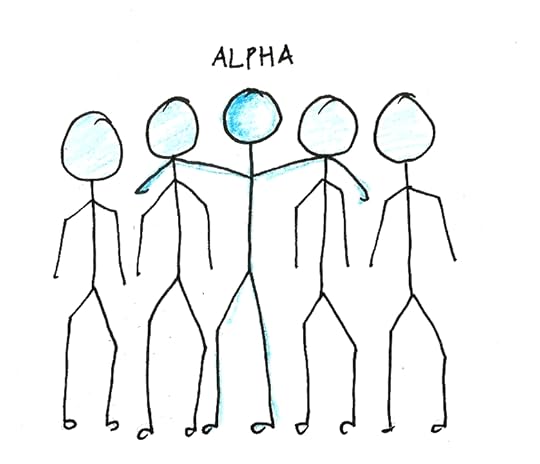
However, it’s perfectly fine to be quiet and reserved. It’s also perfectly fine to not want to get drunk at parties or socialize every night. Recognize that the goal is to be the best version of yourself, not a different person.
3. Learn to listen more than speak
Another mistake I used to make was thinking that social skills was about saying the right things. That charismatic people were those who had the right response to any situation, they were witty and charming while others fumbled with their words.
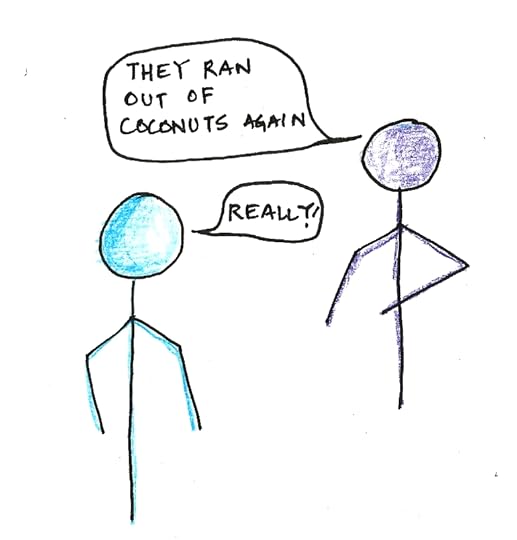
In truth, listening is a much more important social skill than talking. The first reason this is true is that most people care mostly about themselves. Being a good listener already improves your social desirability because you give people what they want—someone who is interested in them. The second reason listening matters is because it forces you to pay attention to social cues. Most of being good socializing is about being sensitive to the context so you’ll know what you can say.
4. Pick interesting things first, socialize second
When I first moved to Vancouver, Canada, almost eight years ago, I knew nobody. As a result, I went to Meetup.com and went to a bunch of meetups to try to make friends. This actually worked, a few of those people I met I’m still friends with today.
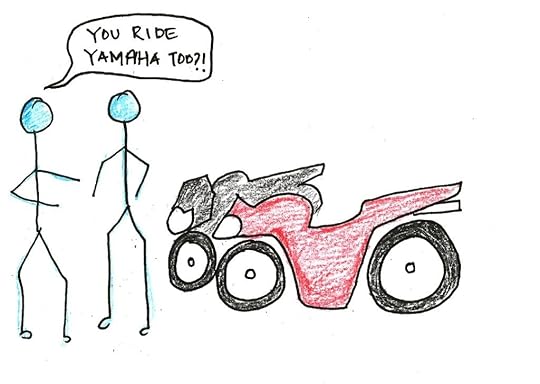
However, I think a mistake can be to try to socialize from the perspective of meeting people itself. This has two drawbacks. First, it doesn’t give you anything in common with the other person. If you meet someone at a bar, your only overlap is that you both like going to bars. Second, these events can have a “lemon” problem, where people who are normal make friends and leave these groups, leaving behind the people who are the most unpleasant.
A better solution is to pick socializing events that are pre-selected for a particular interest. If you’re going to go to a meetup, it ought to be one that you go to because you’re interested in what they do—whether that’s photography, French or baking.
Developing confidence in social situations takes time and practice, but if you put in the effort you can make it work.
The post An Introvert’s Guide To Building Confidence (In 4 Not-So-Easy Steps) appeared first on Scott H Young.
July 23, 2019
The Best Articles on Life Philosophy
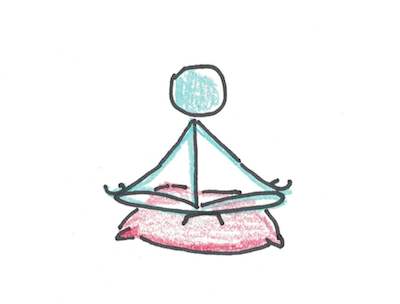
How should you live? In many ways, my blog is devoted to trying to pull apart and answer this question. Over the last decade, I’ve written a lot trying to do this, here are some of the best articles.
The 5 Best Life Philosophy Articles
Here are my best five essays on how to live better:
Most Books Won’t Change Your Life (But You Should Read Them Anyways) – You should read more books, even if you can’t apply them all.
Can Life Have Too Much Meaning? – We tend to think of meaning as something we want more from life, not less. However, many symptoms of modern life may actually be from having too much meaning, not too little.
Is Reading Blogs Like This One Keeping You From Improving Your Life? Is reading a complement or substitute for doing the work of self-improvement?
Should You Target the Minimum? – I discuss minimum, average and maximum targeting and how these three different approaches differ for pursuing all sorts of goals.
Are You Living Your Life or Just Planning Your Biography? – The difference between how life is experienced and how it is remembered can result in choices that make you worse off.
On Achievement and Failure
Here are some of my thoughts on achieving success and overcoming the failures that come with it:
Fear Fizzle More than Failure – Most efforts die out long before we could call them failures. To really succeed, live in a way that true failure is also a possibility.
The Three Different Types of Luck – Chance influences all outcomes, but not all types of luck should have the same response.
What’s Next? How to decide what to do after you reach the thing you’ve been questing after.
Know Your Competition – Who are you competing against? The middle? The best? The status-quo? The answer should change how you approach it.
Are Successful People Just Putting in More Effort?
You Should Have More Spectacular Failures
What Should Your Goals Be?
How I Choose Projects
How to Lead an Interesting Life and Still Get Stuff Done
If You’re Young, Do Harder, Riskier Things
Is Obsession a Prerequisite for Success?
Routine is the Enemy of Good
Should You Plan to Retire
Is the Ideal Lifestyle Designed or Earned?
Ruthless Focus and the Art of Saying No
What are You Going to Be Exceptional at in 10 Years?
Don’t Swim in the Shallow Waters
On Ideas, Books and Reading
Should You Follow Less News?
Is Old Advice Better? – Is advice that comes from older traditions better? I weigh both sides of the debate.
The Power of Being Weak
Does it Matter Whether Advice is Authentic? – Why should the origin of advice impact its usefulness?
How to Pick Which Books to Read
Book Club: Tao Te Ching – My thoughts on the Eastern classic.
Book Club: Zen and the Art of Motorcycle Maintenance – The first book club, with a classic.
The Problem with Advice
Should You Know Your IQ?
Being Honest with Yourself is Hard
Are There Books You Should Re-Read Every Year?
Should You Maintain an (Almost) Empty Reading Queue?
Never Be Too Pleased With Your Past Work
Living Closer to Reality
Cynicism is Easy, Optimism Takes Guts
Here’s What’s Wrong with Self-Help
Should an Atheist Be Reading the Great Books of Religion?
Does Thinking About the Ideal Life Actually Lead to Living One?
Criticism and Praise are the Same
On Choosing What to Do
Should You Fix Weaknesses or Focus on Your Strengths? Here’s How to Decide.
Should You Desire More or Less?
How to Make Hard Life Decisions
Can You Change What You Like?
The Simple Algorithm for Making Big Life Decisions
Games Worth Playing – The most important decision you can make in life is deciding which game to play.
On Keeping Your Word
Watch Out for “Good” Ideas
Blank Slate Moments
Philosophical Tourism
What if Luck Matters More than Effort?
Day Jobs vs Side Projects
Staying in School Forever
The Obvious Choice is Often the Worst One: Why People Fail Choosing Jobs, Classes and Dates
Silencing the Background Noise of Life
If You’re So Smart, Why is Your Life Still a Mess?
Should You Wander the World or Build a Home?
Does the Ideal Life Depend on Your City?
The Pleasure of Living Within Constraints
Should Your Twenties Be for Work or Play?
On Finding Your Purpose in Life
Swimming Upstream Against Your Destiny
Losing Yourself – Maybe we don’t need to “find” ourselves when life feels adrift, but lose our notions of who we are?
We Become the Story We Tell Ourselves
World Travel or Finding Passion Won’t Escape Who You Are – You can’t run from yourself.
Don’t Know What You Want?
Feeling Lost? Stop Worrying About Your “Life Purpose”
Are Passions Discovered or Constructed?
The Power of Curiosity
On Values and Deciding What Matters
(A Little) Conformity is a Good Thing
Who Has Time for Hobbies?
What’s Your Life Strategy?
Why You Should Be More Extreme
Do You Need Self-Discipline to Have Fun? – Why having fun is more effort than it seems.
If You Had Ten Years to Learn Anything, What Would You Do?
First, See the Circle – The only way you can break out of your patterns in life is to first notice them.
Are You Trying to Be Too Original? What I Learned About the Value of Imitation From China
Be Bold, Presumptuous and Stop Caring What Others Think
The Fear of Going Soft
Things Worth Knowing, Even Poorly
Wanting the Right Things
Does Enjoyment Trump Efficiency?
Asking the Right Questions
Inconvenient Conveniences — Is Easier Always Better?
The Serious Pursuit of Fun
How to Chip Away at Your List of Necessities
You’re Going to Lose Everything Eventually
Doubt
Humility is More Important than Confidence
Average Doesn’t Mean Secure
Need Little, Want Lots
What’s Your Poverty Threshold?
The post The Best Articles on Life Philosophy appeared first on Scott H Young.
July 22, 2019
Update on My 10-Year Plans at Becoming Exceptional
Ten years ago this month, I wrote an article on this blog titled, “What are You Going to Be Exceptional at in 10 Years?”
In the article, I picked two skills I wanted to get good at over the following decade: writing and micro-entrepreneurship.
I’m not sure why I felt the need to write “micro-entrepreneurship” instead of simpler terms like “entrepreneurship” or “running a business.” I suppose that’s probably because I still had a lot to learn as a writer.
Now that I’m ten years older, how did those two plans fare?
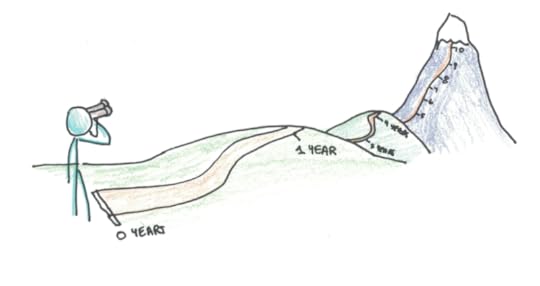
Entrepreneurship
In terms of (micro)entrepreneurship, I feel like I actually have gotten fairly good at it. I’ve run a business for so long now that many of the hard-won lessons of the past decade just feel obvious to me. It’s only when I talk to people who are just trying to start businesses that it’s clear how much I’ve learned from my past mistakes.
In ten years, I’ve gone from struggling to make enough money to pay bills, to earning enough to live comfortably, to having a small team with quarterly meetings where we use words like “strategy” and “branding” and make goals based on charts with quadrants.
There’s a lot of ways to be an entrepreneur, so my ambitions may not reflect yours, but I feel like I did a pretty good job, being able to earn a comfortable income doing what I love on my own terms.
Writing
When I go back a decade and read old posts, I often cringe at my writing. My old headlines are unappealing yet also clickbait. I have long, rambling paragraphs nobody will read, and yet other parts of my writing seem glib.
I’d like to think my ideas have matured as well, but I find it interesting that often I’ll write a new article and then find an older, more poorly written version of it sitting several years back in my archive. I’ve written so many posts, I hope the readers will forgive a few accidental reruns.
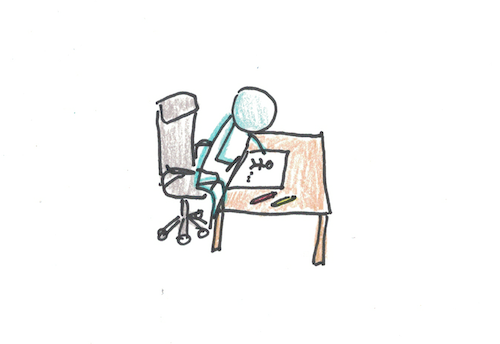 I’ve also started doodling these little drawings too!
I’ve also started doodling these little drawings too!Although my blog writing has improved a bit, my books have gotten much better. Comparing Learn More, Study Less (which I wrote over ten years ago) to Ultralearning, and they seem unrecognizably different. Learning how to do research, tell stories and properly source my work were skills I developed later as a writer.
What I Got Wrong
Ten years feels like a long time. Especially when you’re twenty.
It feels a bit like how the British signed a 99-year lease on Hong Kong. Ninety-nine years is basically forever, right? I’m sure this won’t cause any issues in a century when China wants it back.
Similarly, decade-long goals are hard to act on because the person you’ll be ten years from now feels so distant. I imagined ten years of writing and running a business would put me at a level of mastery. Now, having lived the last ten years, I feel like my career as a writer and entrepreneur are just beginning, with a lot more lessons still left to learn.
In this sense, I feel like my plans were, ironically, somewhat shortsighted. I saw ten years of improving writing and business and couldn’t imagine there would be much more to attain. After ten years, I’ve become aware of just how much further there is to go.
What I Got Right
I used to joke about famous people I met when their blogs were still smaller than mine. Chris Guillebeau, Leo Babauta, James Clear, Benny Lewis. I think I even met Cal Newport before he started his blog. Now these people have juggernaut businesses and bestselling books.
Deep down, however, there was probably more than a hint of envy that it took me so much longer to get established. Chris Guillebeau wrote a book 279 Days to Overnight Success. Well mine was more like 1825 days, and even then it wasn’t easy to call it a success. Seeing peers eclipse you professionally can be tough, especially when you’re grinding away every day.
As I look back, however, I’m so grateful that I started early and worked hard. It’s easier to be a starving writer when you’re already a broke student. Bootstrapping is easier when your poverty threshold is $20,000 a year. Failures are easier to swallow when you still have “potential” instead of just a lousy track record.
I often meet new writers today, who are my age, but just getting started. I hope they’ll work hard. I hope that success won’t take them as long as it did for me. I hope they won’t get discouraged as the future can often be a hard road with an uncertain destination. Above all, I hope they’ll look at the next ten years with enthusiasm at the prospect of getting good rather than despair at the distance they still need to travel.
Even if ten years was too short to expect excellence, I’m glad I picked something and worked hard on it, especially when success seemed so far away. Hopefully, ten years from now, I’ll be able to look back at how far I’ve come.
The post Update on My 10-Year Plans at Becoming Exceptional appeared first on Scott H Young.
July 19, 2019
Do You Even Want Success? (The Perils of Achievement Bias)
Biases distort our perception of reality.
Consider survivorship bias. This is the fact that when viewing a group, you often only have the ability to look at the success stories, not the losers. As a result, you may be deceived that certain traits matter because they show up in all successes (even if they also show up in a lot of the failures too).
Or consider the friends’ paradox. This occurs because your assessment of what is common amongst your peers is based on what your friends do. However some people have more friends than others, which means that when you take an average of your friends, the more extroverted people get counted more. This leads to perceptions of drinking and promiscuity being higher than the actual average, due to a distortion in who you look at.
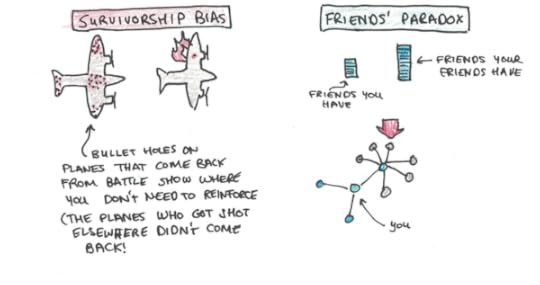
These biases are real, but today I’d like to look at a different one: achievement bias.
Achievement Bias: You Only Hear About Those Obsessed with Success
Consider two friends. One decides that becoming a successful scientist is the most important goal in life, works non-stop and eventually becomes a Nobel-prize winner. The other decides that a nice, comfortable family life matters more and earns a respectable income, but never becomes world famous.
Question: whose biography are you going to read?
The peril of achievement bias is that achievement crowds out other values when considering what makes a good life, as seen in the lives of others. If we assume that valuing achievement is at least correlated with achieving it, the result is that those who achieve great success disproportionately value achievement compared to the average.
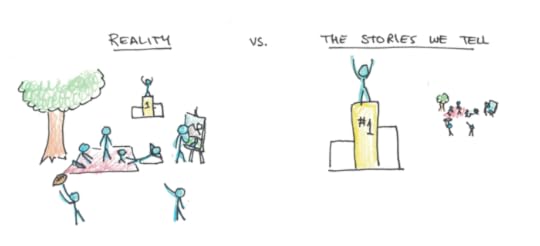
There are two major dangers to achievement bias.
The first is that it makes the pursuit of success look more common than it really is. Since you only see and read from the minority of high-achievers, it can create the impression that most people also value success to the same degree.
The second danger is that those who don’t value achievement at all are silent. In other words, if you value something that is incompatible with success, your story is unsung and nobody will hear about it. This can mean that the virtues of a life not devoted to striving are missing.
Why Even Famous Non-Achievers Over-Achieve
The real funny part of achievement bias comes when it deals with the “success” of speakers, thinkers and philosophers who pride themselves on virtues other than achievement.
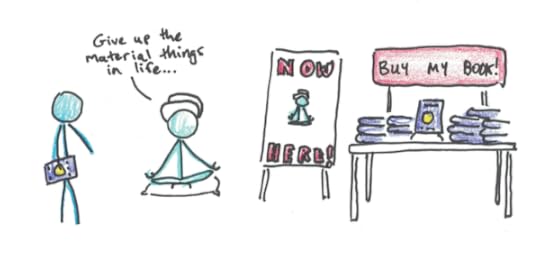
Nearly every famous speaker and writer on spirituality, whose work argues in favor of well-being over material success, is nonetheless famous and successful. Which means that those people are either accidentally successful, or they are at least selectively hypocritical to their own message—focusing on massive outreach, book deals, speaking tours and seminars over inner peace.
This isn’t to rebuke those people. In some ways, I laud them for having the ability to tell a much-needed message despite the fact that achieving such a message often times counters to the philosophy they try to espouse.
My point isn’t to criticize the hypocrisy but point out that even with mild hypocrisy the promotion of achievement as a virtue is probably excessive.
I’m just as wrapped up in this as anyone else. I also value achievement very highly. That valuing has put work central to my life in times when it wouldn’t have been for other people. That same prioritization also means you’re reading my words today. Thus, the advice you receive from me is, at least in part, a factor of my personality and values rather than a truly objective assessment of what is best for you.
Why Might an Overemphasis on Achievement Be Bad?
Life is full of trade-offs. You can sleep in or wake up early to work. Spend money on that fancy trip or put those dollars away for retirement. Stick to your diet, or enjoy that pizza.
Achievement, like all other good things in life, must also trade-off against other values at the extremes. Albert Einstein was a great scientist, but he also had a lousy marriage. While I think the world is better off from his dedication to science, I’m not sure his wife would have agreed.
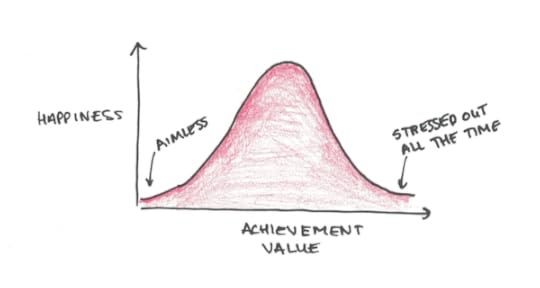
Prioritizing achievement itself is a valid choice. The problem with achievement bias is that if you want to learn and study from people who aren’t in your immediate vicinity, it’s difficult to learn from anyone who didn’t prioritize achievement in this way.
Is there a hidden subset of the population that are happy and unremarkable? Perhaps these exemplars are worth learning from more than just the people who made millions by obsessing themselves with success.
How Do You Counteract Achievement Bias?
Achievement bias is like all other cognitive biases, easy to point out, very difficult to overcome.
For every pundit that heckles, “Survivorship bias!” when someone talks about the morning routines of famous CEOs, I want to yell back, “But what are people supposed to do?” The fact is that even if there is a survivorship bias, gathering up all the people who weren’t successful and statistically controlling for their results is an enormous project that would require teams of trained researchers. Not something an ordinary person can actively counteract.
Achievement bias is similar, because it’s harder to argue the opposite. Writing is a skill. Like most skills it takes years of work to get good at, the kind of thing that someone who values achievement might do. If you don’t value achievement, and don’t get really good at writing, you probably won’t be very articulate arguing in favor of non-achievement as a virtue.
I think this bias probably means we should consider non-achievers words more carefully, especially since those voices are rarer. It also means we ought to talk to more everyday people and not merely look up to the most famous and successful for all worldly wisdom.
The post Do You Even Want Success? (The Perils of Achievement Bias) appeared first on Scott H Young.
July 18, 2019
There is No “Real” You
Be yourself. Be genuine. Show people who you really are. Our culture is obsessed with authenticity. But what if the entire idea of being authentic is based on a lie?
There’s a pervasive belief people hold that the person they appear to be is not who they actually are. Underneath all the masks, there’s a real face that’s yours.

This is a myth. There is no “real” you. The “real” you is just another mask, and often one that gets in the way of you being a better person.
Why is the “Real” You Always Better?
The first thing you’ll notice whenever you hear someone talk about their “real” self is that it’s never negative. No matter what they’ve done, the “real” version of themselves is just hurting, or confused, or lashing out.
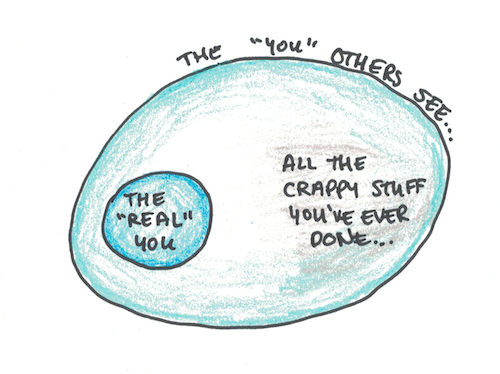
This already is a huge red flag. People are shitty all the time. They lie, cheat, steal and hurt others. They do this because, in many ways, we didn’t evolve to be perfect angels. We’re a mix of good and bad, although some of us are mixed in different ratios.
So if people are shitty, why is the “real” you always good?
I think the reason is that the “real” you is a self-serving deception. It’s a rationale that explains away all the bad things you’ve done by saying that it wasn’t the “real” you that did that, but something distinct from yourself. It wasn’t the “real” you that lied to your friend, but just something inauthentic you did because you were worried about being judged.
In this sense, the “real” you isn’t truer or more authentic. Rather it’s who you wish you were (or perhaps, more accurately, how you wish other people would see you). That this picture tends to be flattering should be less reason to trust it, not more.
Who Knows You Really?
In an interesting study, close friends were better at predicting some personality traits on a subsequent test than the subjects themselves.
This means that, in some real sense, the people around you who only observe your actions, the people who never see your innermost thoughts and self, nonetheless are better at estimating aspects of your personality than you are.
Consider two possible hypotheses. The first, and most popular, is that there’s a “real” you lurking underneath your behavior to which only you have access. Certainly, if this were true, you’d score much better on self-assessments than people around you, often people who only have access to more superficial layers of what you say and how you act?
Now, consider my hypothesis: that the “real” you is just as much a performance as everything else, except the audience isn’t other people—it’s you. Under this view, it’s no wonder other people around you cannot guess your personality better, they have less reason to deceive themselves about it!
How Your Real Self Gets in the Way of Genuine Growth
In some ways, the idea of a “real” self is a comforting delusion. It allows us to make peace with whatever bad things we’ve done in the past by divorcing them from who we “really” are.
However, this delusion can be damaging if it keeps you from making changes to the person you appear to be. When your “real” self is good, this can insulate you from needing to make changes to the “outer” you that other people witness. After all, if you’re a great person deep down, as long as people get to know you, it doesn’t matter so much that you’re an asshole to everyone else.
Removing that delusion can be painful. It can be painful to admit that the people we feel we are deep down is no more central to our existence than the way we act, speak and behave for the world to see. But removing that separation can also foster growth. Seeing how you’ve hurt people or lived a life less than ideal, and recognizing that you can’t rationalize those harms away, can also give you the impetus to change them.
What are You Really?
Selves, in the end, are just simple models of a more complex reality. That you have a name, personality, abilities, mannerisms, memories and preferences are just ways of simplifying a tremendously complicated reality.
Ultimately, who you are is just a story you tell. Sometimes, in the case of “real” selves, it’s a story you tell yourself (and often a self-serving one). Other times, who you are is a story you tell other people.
Any good writer or journalist will tell you that any event can have innumerable true stories told, depending on what is emphasized or omitted. That a story is merely true still leaves enough degrees of freedom that there can be wildly different impressions generated from it.
As the “real” you is just a story you tell yourself, you can also change it if you want to. Not just your future, but also your present and your past. Not through lying, but through recognizing that there were always countless true stories of yourself that you just aren’t used to telling yet.
The post There is No “Real” You appeared first on Scott H Young.



